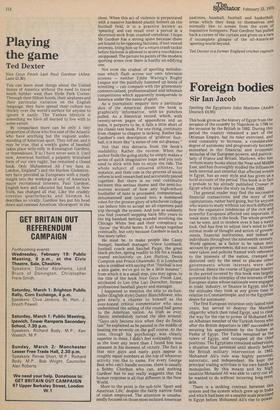Playing the game
Ted Dexter
Nice Guys Finish Last Paul Gardner (Allen Lane E3.50) You can learn most things about the United States of America without the need to travel much further west than Hyde Park Corner. Through their Hilton hotels, their airplanes and their particular variation on the English language, they have spread their culture too thickly over the world's surface for anyone to ignore it easily. The Yankee lifestyle is something we have all learned to live with to some extent.
By comparison there can be only a tiny proportion of those who live east of the Atlantic who have anything but the vaguest understanding of American sport. They tell me, and it may be true, that a weekly game of baseball takes place willy-nilly in Kensington Gardens, or thereabouts. If so I have never seen it. Until now, American football, a palpably brutalised form of our own rugby, has remained a closed book. Only Muhammad Ali ("my fans in London, England") and the Harlem Globetrotters have provided us Europeans with a ready insight into the workings of any of America's major recreational interests. Paul Gardner, English born and educated but based in New York, has changed all that. Like the crudely oversize quarterbacks and linemen he describes so vividly, Gardner has put his head down and rammed American `showsport' in the chest. When this act of violence is perpetrated with a massive hardened plastic helmet on the football field, it is a practice known as 'spearing' and can result over a period in a shortened neck from crushed vertebrae. I hope Mr Gardner has a strong spine because' there are bound to be opposing factions, if not vested interests, lining him up for a return crash tackle before his book is allowed to score a touchdown unopposed. The picture he paints of the modern sporting scene over there is hardly an edifying one.
Not even the crudest of sporting melodramas which flash across our own television screens — neither Eddie Waring's Rugby League nor the painfully hammed up bouts of wrestling — can compare with the gruesomely commercialised, profession alised and inhuman competitions which apparently masquerade in America under the name of sport.
As a journalistic enquiry into a particular slice of the American dream the book is graphically informative, with no punches pulled. As a historical record, which, with twenty-seven pages of appendices and an index, it purports to be, it falls a little short of the classic text book. For one thing, continuity from chapter to chapter is lacking. Rather like Gardner's own description of 'gridiron' football, it is more like "a series of one act dramas."
Not that this detracts from the book's readability. Rather the reverse. When the author finds the going sticky he simply makes a series of quick imaginative leaps and you only need to stick with him to enjoy the ride. The whole subject of coloured athletes, for instance, and their role in the process of social reform is well researched and accurately pieced together. But there is no real continuity between this serious theme and the semi-humorous account of how any high-school footballer of note is processed, computerised, dehumanised and turned into a numbered robot for the greater glory of whichever college can induce him to accept an all expenses paid trip through the system. And just as suddenly 'you find yourself stepping back fifty years to the big baseball betting scandal involving the Chicago White Sox and their conspiracy to 'throw' the World Series. It all hangs together eventually, but only because Gardner is such a fine story-teller. He must be, to make people like Casey Stengel, baseball manager, Vince Lombardi, football coach and Satchel Paige, the great black pitcher, spring readily to life for a reader reared exclusively on Len Hutton, Denis Compton and Prince Obalenski. It is Lombardi who is credited with saying that "football is not a nice game, we've got to be a little meaner"; from which it is a small step, you may agree, to the title of the book Nice Guys Finish Last, attributed to Leo (the Lip) Durocher, former professional baseball player and manager. I happened to mention the title to ex-footballer (English style) Danny Blanchflower, who gets nearly a chapter to himself as the over-honest critical commentator who once undermined the selling of the round ball game to the American nation. As Irish as ever, Danny immediately turned the idea around: "Guys only become nice when they do finish last" he explained as he paused in the middle of beating me severely on the golf course. At the time, though his psychology was clearly superior to mine, I didn't feel noticeably nicer as the loser any more than I found him less pleasant in his moment of victory. The fact is that nice guys and nasty guys appear in roughly equal numbers at the top of whatever activity you like to name. For every George Best who can't handle success, there is usually a Bobby Charlton who can, and nothing Gardner has to say really suggests that the human response is all that different in the New World.
More to the point is the sub-title 'Sport and American Life,' despite the fairly narrow field of vision employed. The attention is unashamedly focused on those most isolated American pastimes, baseball, football and basketball, areas which they keep to themselves and normally like to screen from the eyes of inquisitive foreigners. Paul Gardner has pulled back a corner of the curtain and given us a rare if incomplete glimpse of the all-American sporting world beyond.
Ted Dexter is a former England cricket captain


































 Previous page
Previous page